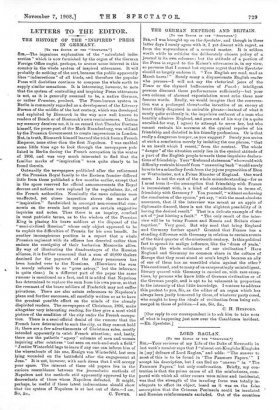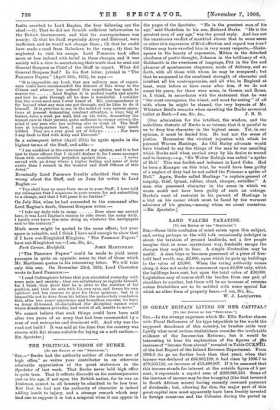LORD RAGLAN.
[To THE EDITOR or THE "SPECTATOR." J
Sin,—Your reviewer of my Life of the Duke of Newcastle in last week's number says that I "almost out-Kinglake Kinglake in [my] defence of Lord Raglan," and adds : " The answer to most of this is to be found in ' The Panmure Papers.' " I accept his description, but I can find no "answer " in " The Panmure Papers," but only confirmation. Briefly, my con- tention is that the prime cause of all the misfortunes, com- pared with which all other causes were minor and Incidental, was that the strength of the invading force was totally In- adequate to effect its object, based as it was on the false assumption that the Crimean Peninsula could be insulated and Russian reinforcements excluded. Out of the countless faults ascribed to Lord Raglan, the four following are the chief :—(1) That he did not furnish sufficient information to the British Government, and that his correspondence was scanty ; (2) that his Staff, especially Airey and Estcourt, were inefficient, and he would not change them ; (3) that be could have made a road from Balaclava to the camp ; (4) that he neglected to visit his camps. Lord Panmure took office more or less imbued with belief in these charges, and it was mainly with a view to ascertaining their truth that be sent out General Simpson as Chief of the Staff to report. What did General Simpson find ? In his first letter, printed in "The Panmure Papers" (April 16th, 1855), he says :-
"It is impossible, my Lord, that any military man of experi- ence could have recommended the descent of this Army in the Crimea and whoever has ordered this expedition has much to answer for Lord Raglan is in perfect health and spirits and how he gets through all he does is wonderful. I consider him the worst-used man I ever heard of. His correspondence is far beyond what any man can get through, and he likes to do it himself. It is grievous to see, in the midst of very serious opera- tions at present demanding constant attention, a huge bag of letters, twice a week per mail, laid on his table, demanding the utmost care in their perusal, quite sufficient to occupy entirely the mind of any man who has nothing else to think of. The Staff here at headquarters have, I am convinced, been very much vilified. They are a very good set of fellows Nor have I any fault to find with Airey and Estcourt."
In a subsequent letter (April 27th) he again speaks in the highest terms of the Staff, and adds :- " I am confident in the correctness of my opinion, and it is but just to these officers that I should declare it, for I came amongst them with considerable prejudice against them I never served with an Army where a higher feeling and sense of duty exists than I remark in the General and Staff Officers of this Army."
Eventually Lord Panmure frankly admitted that he was wrong about the Staff, and on June 1st writes to Lord Raglan :— " You shall hear no more from me as to your Staff; I have told my colleagues that I acquiesce in your reason for not submitting to a change, and that I will press it no further."
On July 31st, when he had succeeded to the command after Lord Raglan's death, General Simpson writes :— " I take my daily ride in camp Ever since my arrival here, it was Lord Raglan's custom to ride about the camp daily. I hardly ever knew him miss doing so, whatever the newspapers said to the contrary."
Much more might be quoted to the same effect; but your space is valuable, and I think I have said enough to show that if I have out-Kinglaked Kinglake, " The Panmure Papers " have ontainglaked me.—I am, Sir, &c.,
L" The Panmure Papers" could be made to yield many passages in quite an opposite sense to that of those which Mr. Martineau quotes in his interesting letter. We will take only this one. On December 23rd, 1855, Lord Clarendon wrote to Lord Panmure :— " I read Codrington's letters that you circulated yesterday with some pain and anxiety ; they are satisfactory as regards himself, for I think they show that he is alive to the realities of his position, and that he sees with his own eyes, and forms his own opinions and has reasons to give for those opinions; but it is impossible not to draw from his letters the melancholy conclusion that, after two years' experience and boundless expense, we have an Army ill-housed, ill-disciplined (for discipline cannot exist where drunkenness prevails), and worst of all, unable to move."
We cannot believe that such things could have been said after two years of an army that had been commanded by a man of real enterprise and dominant will. And why was the road not built ? It was said at the time that the country was strewn with flat stones suitable for laying on a soft surface.— ED. Spectator.]





























































 Previous page
Previous page